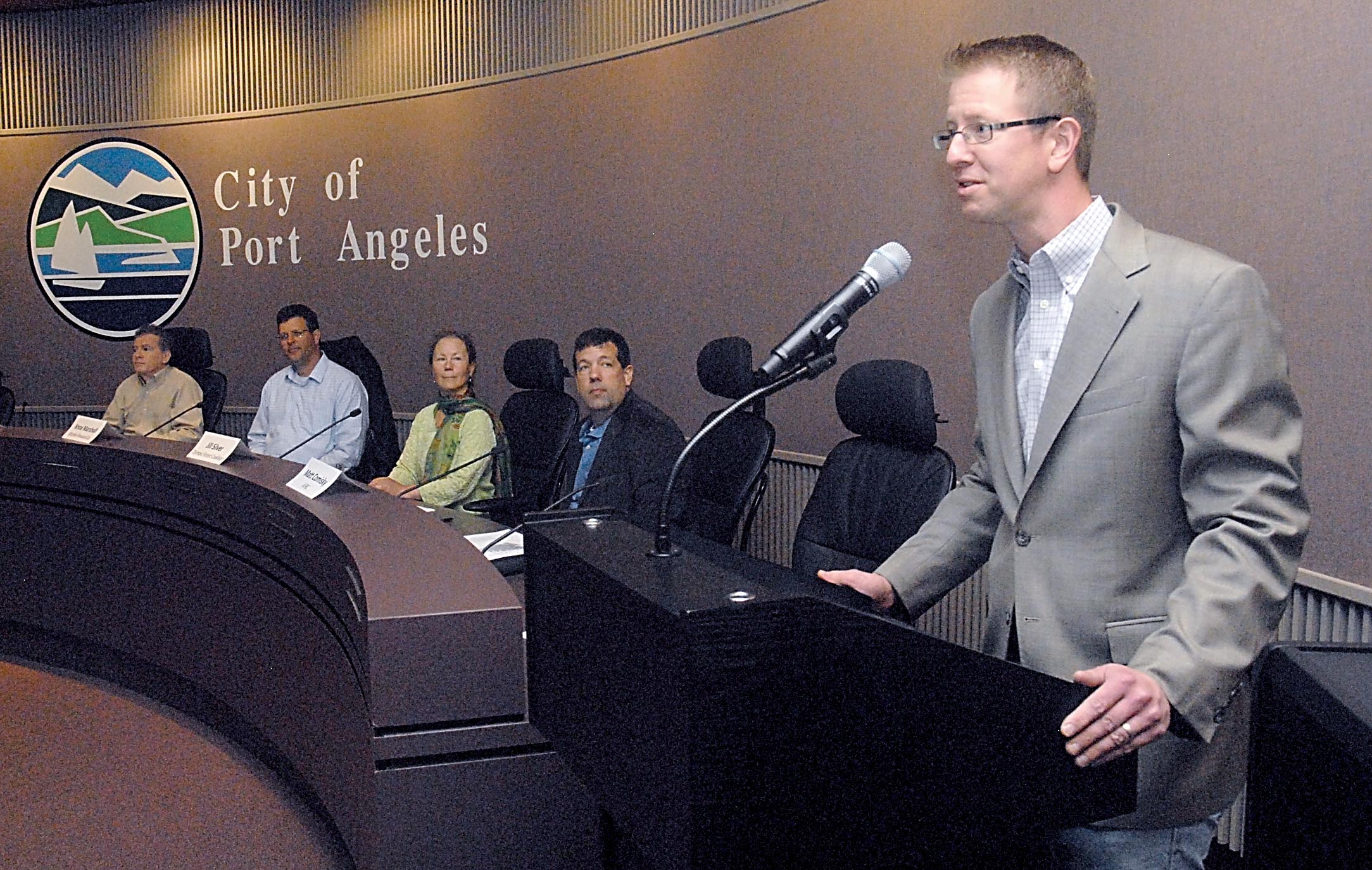PORT ANGELES — U.S. Rep. Derek Kilmer presided at the official launch of an effort to put environmental and logging interests on a single, mutually beneficial path while harvesting for profit — and preserving for future generations — Olympic National Forest.
The two sectors, often on opposite sides of the debate over forest practices and preservation, have joined together in the Olympic Peninsula Collaborative spearheaded by Kilmer.
The group’s goals were explained to more than 50 observers Friday in the City Council chambers at City Hall.
The hourlong meeting was called by Kilmer, the 6th Congressional District Democrat and Port Angeles native whose district includes Grays Harbor, Clallam and Jefferson counties.
“Fights over our forests are well-known,” Kilmer said in opening remarks before an audience packed with state legislative and local elected officials, tribal representatives and environmentalists.
“Books have been written about it.”
In forming the collaborative, both sides of the debate he described have agreed “we can responsibly increase harvest levels in a way that would benefit our forests as well as build consensus around specific projects and outcomes,” Kilmer said.
“I’m hoping today marks a turning point for this region and one we can take advantage of.”
The session included a panel discussion by Matt Comisky of the American Forest Resource Council, Knox Marshall of Murphy Plywood Co. of Elma and Jill Silver and Toby Thaler of the Olympic Forest Coalition of Quilcene.
In addition to remarks by Kilmer, individual presentations were made by Comisky, Thaler, Forest Supervisor Reta Laford of Olympic National Forest and Lloyd McGee of Arlington, Va.-based The Nature Conservancy.
Thaler put the discussion in terms meant to go beyond those that have framed the logging-versus-preservation debate for decades.
“We need to get to the point where we agree to not disagree,” he said.
Forest practices that benefit both environmentalists and logging interests include selective harvest to accelerate development of old-growth-character habitat and diminish the growth of denser, smaller stands, participants said.
Laford said the Donkey Creek timber sale of 7 million board feet on 302 national forest acres in Grays Harbor County, accomplished with the help of the Olympic Peninsula Collaborative, was an example of joint efforts.
The sale was completed six to eight months earlier than anticipated after the collaborative offered four experts to help survey and lay out the sale, more than doubling the efforts of what would have otherwise been a three-person Forest Service staff to lay the groundwork.
“It was invaluable,” Laford told the audience.
“We are now in the process of analysis to see if that tool might be an opportunity to improve efficiencies on future sales.
“When we have collaboration, we have better-designed projects, we have less controversy and we are able to initiate projects on the ground with mutual benefit.”
Marshall saw the collaboration as a breakthrough, calling it critical for his company.
“For the Forest Service to openly accept that help, that demonstrates a real positive,” he said.
“The trust factor is working.”
Silver said the effort met the Forest Service’s goals, improved environmental protection and identified forest restoration opportunities.
The 15 members of the collaborative include the resource council; Cosmo Specialty Fibers of Cosmopolis in Grays Harbor County; Interfor Corp. of Vancouver, B.C., which has a mill in Port Angeles; Merrill & Ring Inc. timberland management company of Port Angeles; Olympic Park Associates of Mill Creek; The Mountaineers of Seattle; and the Quilcene-based Wild Olympics Campaign.
Collaborative members also include members of local and federal governments.
“Ultimately, the purpose is to show we can simultaneously create a more environmentally sound forest; provide for increased, sustainable timber harvest on the Olympic National Forest; and provide economic benefits to timber communities on the Peninsula,” according to the group’s mission statement.
The group’s website, www.olympicforestcollaborative.org, was under construction as of Friday.
After the meeting, Carol Johnson, executive director of the North Olympic Timber Action Committee — based in Port Angeles — said she wondered how the national forest would be managed once selective-harvest areas reach their old-growth potential.
“The longer-term future of the forest is managed by the Northwest Forest Plan,” Johnson said.
State Rep. Steve Tharinger of Sequim — who, along with Sen. Jim Hargrove of Hoquiam and Rep. Kevin Van De Wege of Sequim, represents the 24th District, made up of Clallam and Jefferson counties and part of Grays Harbor County — said efforts like those made by the Olympic Peninsula Collaborative could extend to state Department of Natural Resources trust land timber sales.
“Those discussions are going on, but there is no specific structure,” he said after the meeting.
“It always helps to get people in the same room who are on different sides of the issue.”
________
Senior Staff Writer Paul Gottlieb can be reached at 360-452-2345, ext. 5060, or at pgottlieb@peninsuladailynews.com.
